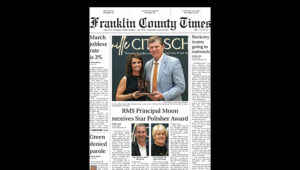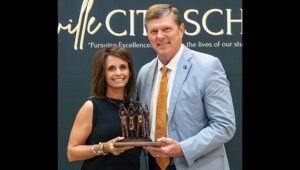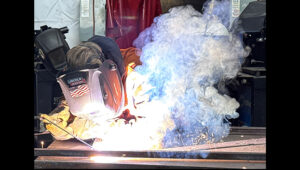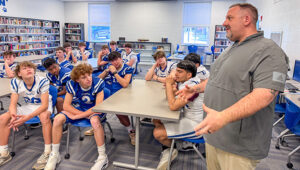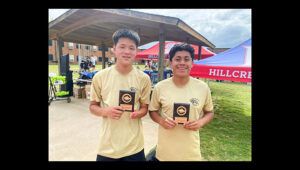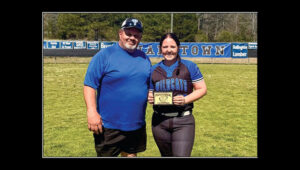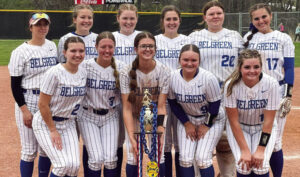Russellville is full of fond memories of Mullins
By Staff
Scot Beard
When you mention Chucky Mullins to anybody who spent time with him, the first reaction is not the sadness you would expect considering the tragic injury that left him paralyzed and separated him from the game that he loved.
Instead you see a smile cross their face and a twinkle appear in their eyes as they remember the times they spent with the Russellville native.
That is the amazing thing about Mullins – he rose to fame as a football player, but his legacy is as a person off the field, not a player on it.
"If you had the outlook he did, this world would not have any problems," said Russellville offensive line coach Ted Ikerd. "You wanted Chucky as a friend."
Mullins faced adversity through out his life, but he had an ability to keep those around him feeling their best even when he was at his worst.
Carver Phillips and his wife Karen became Mullins' foster parents following the death of his mother. Mullins made a quick impression on his new caregivers.
"He was awesome," Carver Phillips said. "He was the type of kid who would do whatever you taught him to the best of his abilities."
That included football.
Former Russelville head coach Don Cox said he never saw a player who loved football the way Mullins did. He even loved to practice, which Cox admits is a rare trait in players.
"He was the most fearless player I've coached," Cox said. "He would run through a brick wall to make a tackle. We had to hold him back to keep him from hurting his teammates."
Ikerd recalls one practice where Mullins hit one of his teammates so hard the coaches told him he would have to yell at teammates if he was going to hit them. That is how the cry of "Crack, crack crack" became one of the most dreadful sounds on the Golden Tiger practice field for Russellville ball carriers.
Mullins' competitive spirit was evident in a game against Colbert County. Mullins was set to return a punt and the coaches sent the other 10 Russellville players to block the kick.
Mullins took the ball with nobody to set up a block for him and returned it for a touchdown.
"That was the greatest individual effort I have seen from a player," Ikerd said. "He wasn't that fast – it was his competitive nature."
Mullins used that competitive nature to make his dream of playing football in the Southeastern Conference a reality. He persuaded Ole Miss head coach Billy Brewer to take a chance and sign him to a scholarship.
Brewer took some convincing because Mullins was an undersized player. Eventually Brewer gave in and got to see first hand what Russellville coaches and fans had seen for years.
"He went full speed every play," Cox said. "It was his great quickness and ability to break on the ball that got him into the SEC."
Unfortunately, Mullins' career was cut short when he was paralyzed while tackling Vanderbilt fullback Brad Gaines. That is when Mullins' legacy really began to take shape.
As Mullins lay paralyzed in a hospital in Memphis, people from all walks of life showed tremendous support for him.
Former President George H.W. Bush visited him in the hospital as did National Football League star Walter Peyton. National Basketball Association icon Michael Jordan sent him a pair of autographed shoes.
There was one visitor that meant more to Mullins than the president or an NFL Hall-of-Famer.
"The main thing he wanted to see in Memphis was the Harlem Globetrotters," Phillips said. "The whole team came to see him and he smiled from ear-to-ear."
During his time in the hospital he always made those visiting know they meant quite a bit to him.
Cox said he and a few assistant coaches went to the hospital the day after the accident.
"I'll always remember that," Cox said. "This was a person with screws in his head and a halo on. He smiles at me and says, 'Did y'all win last night?'
"He was worried about us. It was touching he was in terrible shape but he was still thinking about what we did back here."
Ikerd had a similar experience.
"Coach Butch Harkness and I went to Memphis a week (after the accident). He has the halo on his head and that big smile of Chucky Mullins," Ikerd said. "I wondered how he could smile."
Less than two years later Mullins died from complications from a blood clot that developed because of his paralysis.
It is that unbreakable spirit that is Mullins' legacy today, both here in Russellville and at Ole Miss.
The street passing by the Golden Tigers' practice field is now named Chucky Memorial Drive. The Chucky Mullins Center is a place where children can go after school to play or get tutoring as they chase their dreams.
"We never dreamed it would be as big as it turned out to be," Phillips said. "It's a good feeling to know everybody keeps his name alive."
Ikerd, who was not Mullins' position coach but developed a strong friendship with him anyway, said Chucky goes to every Russellville game. Ikerd said the extra equipment bag has a No. 2 – Mullins' number at Russellville – on the side.
Cox believes Mullins' story should be an inspiration to all the students at Russellville.
"I'm glad they are keeping the memory alive," Cox said. "Chucky was the American dream."


